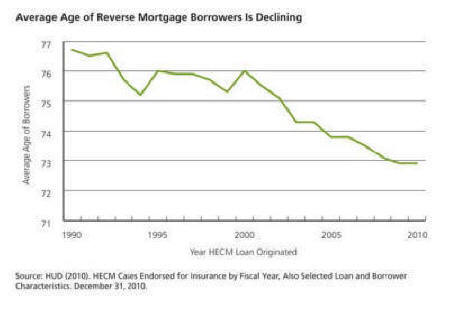A comprehensive new study from the MetLife Mature Market Institute shows the age of those seeking Home Equity Conversion Mortgages (HECM), popularly known as reverse mortgages, has plummeted in the four years since the collapse of the housing market in the U.S. It also reports that these mortgages, special types of home loans that allow people to draw on home equity without monthly mortgage repayments, have evolved into a way for many older Baby Boomers to help manage urgent financial needs. Boomers age 62–64 currently represent one-in-five prospective borrowers  of the product, which was once associated with a much older age group.
of the product, which was once associated with a much older age group.
The Study, produced in conjunction with the National Council on Aging (NCOA), reports that the average age of those who have gone through reverse mortgage counseling has declined and is now 71.5 years of age.
The U.S. Department of Housing and Urban Development (HUD) reports a similar decline in the average age of borrowers to age 73. Forty-six percent of homeowners considering a reverse mortgage are under age 70. The percentage of 62- to 64-year-olds who are prospective borrowers has increased 15 percentage points since 1999, despite the fact that younger applicants have had lower available loan limits.
The study concludes that older homeowners will need assistance and consumer education to ensure that they make wise decisions about the most appropriate use of their “nest egg” of home equity. A consumer guide – The Essentials: Reverse Mortgages is available for free. It is aimed at helping potential borrowers learn more about the product and its implications for their finances.
